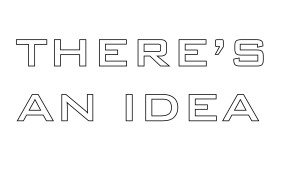I’m always quietly confused why more businesses don’t have a creative resource in-house.
Not a design resource.
An idea generation resource.
Before I go further, allow me a trip down memory lane.
In advertising agencies, creativity was once the realm of the creative department.
As it goes with creativity, some ideas were good, most were average and a few were absolute stinkers.
Then, in the seventies, inspired by the immortal Jon Steel (look him up – Truth, Lies and Advertising), ideation went up-stream and people started looking for ideas beyond words and pictures and became Business Idea Generators.
As it goes with creativity, some ideas were good, most were average and a few were absolute stinkers.
Then, in the early nineties, someone decided to unbundle the media and the production – probably shouting, “Commission!” or “Kick-back!” or “Reptile!” as they broke down the walls.
And creativity was claimed by both media and advertising agencies.
And, at this risk of repeating myself, some ideas were good, most were average and a few were absolute stinkers.
Then, at some stage in the late-nineties, someone in Agency World decided that everyone was “creative”.
(You’ll have to imagine a disgruntled art director using finger quotes there.)
It didn’t do a lot for the ideas. But a lot of people got to wear black.
And then, in the mid-noughties, we (as an industry) determined the word “advertising” wasn’t all-encompassing enough for the sheer spread of creativity available at the agency.
We still did advertising. But we disguised it by using words like social, digital, guerrilla, ambient, online and experiential.
Yet again, some ideas were good, most were average and a few were absolute stinkers.
Then, once the industry had finally got its head around this Total Creativity business, someone decided to put the genie back in the bottle and re-bundle the media and creative components of commercial communications.
Well.
You wouldn’t call it advertising would you.
How terribly 1990’s.
My guess is, some ideas will be good, most will be average and a few will be absolute stinkers.
I think the trouble stems from the word “creative”.
As soon as you give someone a title with the word “creative” in it, the assumption is they believe they’re more creative than others in the business.
There is some truth in this.
Ideas are like opinions.
Everyone’s got one.
And, while everyone is capable of having ideas, not everyone is capable of recognising the value in an idea, understanding the relevance of an idea, executing an idea or knowing when, while it is an idea, it’s one of those ideas for which the word cliché was born.
But creativity does have a role in business.
I believe this to be true.
Usually, most business leaders will shy away from the kind of ideas you see floating around most agency creative departments because most business leaders are rational human beings.
And some ideas, while they are genuine light bulb moments, should only be used to illuminate the path to a better idea and never be seen in public.
This is true of ideas born in agencies. And ideas born in marketing departments.
What most marketing departments lack is a creative director.
Someone answerable to the marketing director, but who would be responsible for generating, recognising and nursing genuine business ideas to life.
Someone who could get to the coal face of the business and work with people embedded in the business to develop ideas that actually helped the business.
Someone who understands that developing ideas, like developing strategy, is hard. It’s about making hard choices. It’s about knowing what not to do.
Someone who can help business leaders see the links between strategy, creativity and operational effectiveness.
Good creative directors get to be creative directors because they’re capable of recognising the value in an idea, understanding the relevance of an idea, executing an idea and knowing when, while it is an idea, it’s one of those ideas for which the word cliché was born. And should be taken out the back and quietly strangled.
The problem used to be that good creative directors wouldn’t choose to go in-house.
But, as we all know, times have changed.
As Michael E. Porter says, “Innovation is the only real competitive advantage a business has.”
Dave Trott puts it more succinctly. “Ideas are the only legal advantage left to business today.”
Given the competitive nature of business today, perhaps we need to try something new.
Put the people who need the ideas in touch with the people who understand how to bring ideas to life.


Leave A Comment